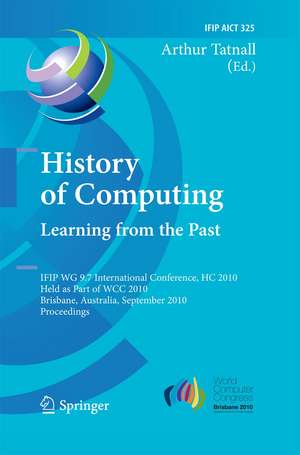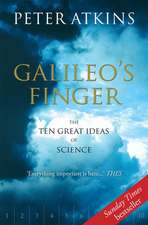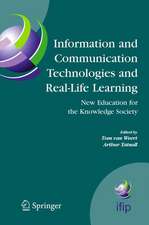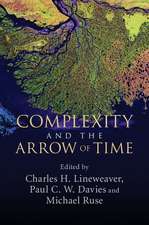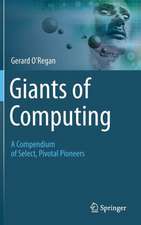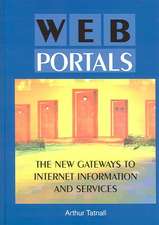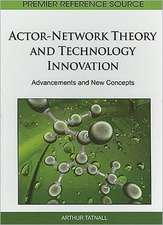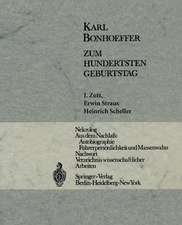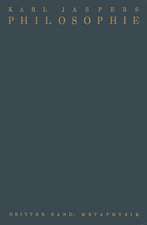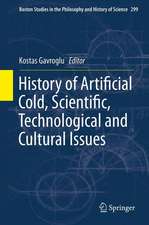History of Computing: Learning from the Past: IFIP WG 9.7 International Conference, HC 2010, Held as Part of WCC 2010, Brisbane, Australia, September 20-23, 2010, Proceedings: IFIP Advances in Information and Communication Technology, cartea 325
Editat de Arthur Tatnallen Limba Engleză Paperback – 13 noi 2014
| Toate formatele și edițiile | Preț | Express |
|---|---|---|
| Paperback (1) | 385.08 lei 6-8 săpt. | |
| Springer Berlin, Heidelberg – 13 noi 2014 | 385.08 lei 6-8 săpt. | |
| Hardback (1) | 390.63 lei 6-8 săpt. | |
| Springer Berlin, Heidelberg – 13 aug 2010 | 390.63 lei 6-8 săpt. |
Din seria IFIP Advances in Information and Communication Technology
- 20%
 Preț: 170.51 lei
Preț: 170.51 lei - 20%
 Preț: 615.75 lei
Preț: 615.75 lei - 20%
 Preț: 340.32 lei
Preț: 340.32 lei -
 Preț: 397.38 lei
Preț: 397.38 lei - 20%
 Preț: 336.02 lei
Preț: 336.02 lei - 20%
 Preț: 340.98 lei
Preț: 340.98 lei - 20%
 Preț: 503.43 lei
Preț: 503.43 lei - 17%
 Preț: 523.41 lei
Preț: 523.41 lei - 20%
 Preț: 502.07 lei
Preț: 502.07 lei - 17%
 Preț: 488.99 lei
Preț: 488.99 lei - 20%
 Preț: 501.05 lei
Preț: 501.05 lei - 20%
 Preț: 403.20 lei
Preț: 403.20 lei - 20%
 Preț: 2194.47 lei
Preț: 2194.47 lei - 15%
 Preț: 708.83 lei
Preț: 708.83 lei - 20%
 Preț: 1162.14 lei
Preț: 1162.14 lei - 20%
 Preț: 1288.25 lei
Preț: 1288.25 lei - 18%
 Preț: 1227.21 lei
Preț: 1227.21 lei - 20%
 Preț: 1282.00 lei
Preț: 1282.00 lei - 18%
 Preț: 1224.18 lei
Preț: 1224.18 lei - 18%
 Preț: 953.03 lei
Preț: 953.03 lei - 18%
 Preț: 953.20 lei
Preț: 953.20 lei - 18%
 Preț: 944.99 lei
Preț: 944.99 lei - 18%
 Preț: 948.29 lei
Preț: 948.29 lei - 15%
 Preț: 645.47 lei
Preț: 645.47 lei - 18%
 Preț: 960.13 lei
Preț: 960.13 lei - 20%
 Preț: 1288.11 lei
Preț: 1288.11 lei - 15%
 Preț: 645.79 lei
Preț: 645.79 lei - 20%
 Preț: 1271.10 lei
Preț: 1271.10 lei - 20%
 Preț: 1922.99 lei
Preț: 1922.99 lei - 20%
 Preț: 1285.97 lei
Preț: 1285.97 lei - 18%
 Preț: 956.69 lei
Preț: 956.69 lei - 18%
 Preț: 946.72 lei
Preț: 946.72 lei - 18%
 Preț: 1224.36 lei
Preț: 1224.36 lei - 20%
 Preț: 1277.89 lei
Preț: 1277.89 lei - 18%
 Preț: 953.03 lei
Preț: 953.03 lei - 18%
 Preț: 947.98 lei
Preț: 947.98 lei - 20%
 Preț: 1292.54 lei
Preț: 1292.54 lei - 18%
 Preț: 956.18 lei
Preț: 956.18 lei - 20%
 Preț: 645.79 lei
Preț: 645.79 lei - 20%
 Preț: 1284.47 lei
Preț: 1284.47 lei - 18%
 Preț: 1235.25 lei
Preț: 1235.25 lei - 20%
 Preț: 998.70 lei
Preț: 998.70 lei - 18%
 Preț: 949.23 lei
Preț: 949.23 lei - 20%
 Preț: 1283.81 lei
Preț: 1283.81 lei - 20%
 Preț: 995.89 lei
Preț: 995.89 lei - 18%
 Preț: 1231.01 lei
Preț: 1231.01 lei - 20%
 Preț: 993.09 lei
Preț: 993.09 lei - 20%
 Preț: 1288.94 lei
Preț: 1288.94 lei - 20%
 Preț: 987.17 lei
Preț: 987.17 lei
Preț: 385.08 lei
Nou
Puncte Express: 578
Preț estimativ în valută:
73.68€ • 77.21$ • 60.91£
73.68€ • 77.21$ • 60.91£
Carte tipărită la comandă
Livrare economică 12-26 aprilie
Preluare comenzi: 021 569.72.76
Specificații
ISBN-13: 9783642423147
ISBN-10: 3642423140
Pagini: 244
Ilustrații: XII, 229 p.
Dimensiuni: 155 x 235 x 13 mm
Greutate: 0.35 kg
Ediția:2010
Editura: Springer Berlin, Heidelberg
Colecția Springer
Seria IFIP Advances in Information and Communication Technology
Locul publicării:Berlin, Heidelberg, Germany
ISBN-10: 3642423140
Pagini: 244
Ilustrații: XII, 229 p.
Dimensiuni: 155 x 235 x 13 mm
Greutate: 0.35 kg
Ediția:2010
Editura: Springer Berlin, Heidelberg
Colecția Springer
Seria IFIP Advances in Information and Communication Technology
Locul publicării:Berlin, Heidelberg, Germany
Public țintă
ResearchCuprins
Connections in the History of Australian Computing.- Why the Real Thing Is Essential for Telling Our Stories.- Wonder, Sorcery, and Technology: Contribute to the History of Medieval Robotics.- Andrew D. Booth – Britain’s Other “Fourth Man”.- The Many Dimensions of Kristen Nygaard, Creator of Object-Oriented Programming and the Scandinavian School of System Development.- Projects and Activities of the IPSJ Computer History Committee.- Contested Histories: De-mythologising the Early History of Modern British Computing.- 50 Years Ago We Constructed the First Hungarian Tube Computer, the M-3: Short Stories from the History of the First Hungarian Computer (1957-1960).- Anatoly Kitov - Pioneer of Russian Informatics.- Materiel Command and the Materiality of Commands: An Historical Examination of the US Air Force, Control Data Corporation, and the Advanced Logistics System.- Purpose-Built Educational Computers in the 1980s: The Australian Experience.- And They Were Thinking? Basic, Logo, Personality and Pedagogy.- The Life and Growth of Year 12 Computing in Victoria: An Ecological Model.- History of the European Computer Driving Licence.- A Brief History of the Pick Environment in Australia.- Turning Points in Computer Education.- Existence Precedes Essence - Meaning of the Stored-Program Concept.- Recession, S-Curves and Digital Equipment Corporation.- ETHICS: The Past, Present and Future of Socio-Technical Systems Design.- Lessons from Discarded Computer Architectures.- The Birth of Information Systems.- The Monash University Museum of Computing History: Ten Years On.
Caracteristici
State-of-the-art research Fast-track conference proceedings Unique visibility
